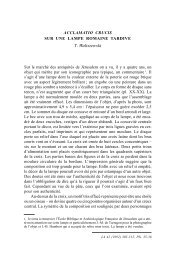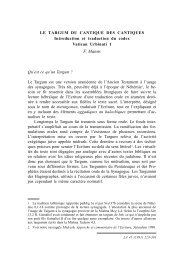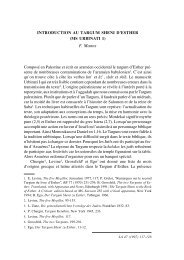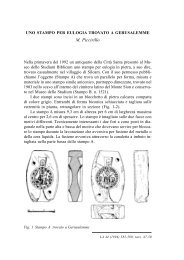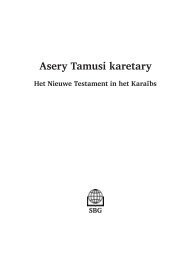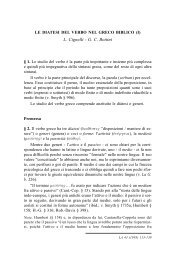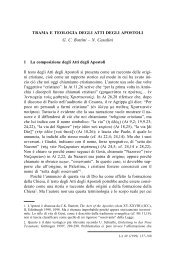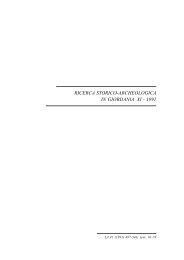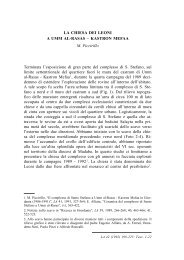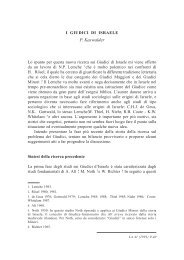Literary Criticism and Theology of P - Christus Rex
Literary Criticism and Theology of P - Christus Rex
Literary Criticism and Theology of P - Christus Rex
You also want an ePaper? Increase the reach of your titles
YUMPU automatically turns print PDFs into web optimized ePapers that Google loves.
18<br />
E. CORTESE<br />
rather generic opinion that P teaches a sort <strong>of</strong> spiritual divine presence in<br />
human beings, as found in Ex 29,43-46, which, as we have seen, is a central<br />
text in the priestly theology. This seems to be the recent conclusion <strong>of</strong> Pola,<br />
despite his big effort <strong>of</strong> appealing to Ezek 20, after his enormous reduction <strong>of</strong><br />
the original text <strong>of</strong> Ex 25-31. And this opinion corresponds to the opinion <strong>of</strong><br />
Janowski 21 , based on the prophecy <strong>of</strong> the new covenant in Ezek 37,26: “I will<br />
set my sanctuary in the midst <strong>of</strong> them for ever”, which he interprets in the<br />
light <strong>of</strong> 11,16: “I will be to them (to the people dispersed among the nations)<br />
a temple for a while (lemiqdaå me‘a†)”; it is a kind <strong>of</strong> divine presence by the<br />
new covenant. Is this a satisfactory interpretation <strong>of</strong> our priestly texts?<br />
There are many types <strong>of</strong> divine presence. We do not consider here the<br />
presence <strong>of</strong> God as the Creator <strong>of</strong> all things, nor His spiritual presence in the<br />
thoughts <strong>of</strong> human beings. But rather we concentrate on the special presence<br />
<strong>of</strong> God among the people <strong>of</strong> Israel, as the modern Jews also are used to think.<br />
Because <strong>of</strong> the election, or, as many say, the covenant with Israel, we can<br />
believe that He has a special presence among them. This could be interpreted<br />
either as the privilege, which the non-Jews cannot share, or as the inclusive<br />
grace <strong>of</strong> God, from which other people can also enjoy.<br />
In whatever way we conceive this relation, it is a shift from the right way<br />
<strong>of</strong> interpreting the biblical message on the divine presence in the tent. We do<br />
not deny the particular relation between Israel <strong>and</strong> God. The relation <strong>of</strong> a<br />
father or a mother to the son, or that <strong>of</strong> a man or a wife to the partner, does<br />
not necessarily imply the idea <strong>of</strong> their real presence. So it might be better to<br />
distinguish carefully the concepts <strong>of</strong> “relation” <strong>and</strong> “presence”. When OT<br />
speaks <strong>of</strong> the presence <strong>of</strong> God in the tent, this signifies something new. Israel<br />
had already a particular relation with God, either by the divine election before<br />
Sinai, or by the covenant stipulated on the mountain. We may better call this<br />
a relation, not a presence, in order to maintain the singularity <strong>of</strong> the presence<br />
<strong>of</strong> God in the tent or by means <strong>of</strong> it in Israel. Ex 29,43ff. discloses this<br />
particular presence rather than the previous one.<br />
3. Theological presuppositions. If we overlook such a distinction, we<br />
would not be able to underst<strong>and</strong> rightly the Sinaitic message <strong>of</strong> P. It consists<br />
exactly in omitting the old message (J, E <strong>and</strong> D) <strong>of</strong> the particular relation<br />
between God <strong>and</strong> Israel reached by the Sinaitic covenant. To the reasons <strong>of</strong><br />
such a Priestly omission <strong>and</strong> the corresponding modern debate, we shall come<br />
back later.<br />
21. Particularly in the article “ ‘Ich will in euer Mitte wohnen’. Struktur und Genese der<br />
exilischen Schekina-Theologie”, JBT 2 (1987) 175-193 (now in Id., Gottesgegenwart, 119-<br />
147).





